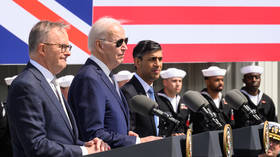The AUKUS deal confirms Australia’s complete dependence on the US and the UK
Canberra is once again serving, and paying for, Washington and London’s regional ambitions
Last week, amidst a great deal of pomp and ceremony at a San Diego, California naval base, Australian Prime Minister Anthony Albanese signed off on the AUKUS submarine deal with the United States and the UK.
Under this extraordinary arrangement, Australia agreed to pay $368 billion for eight nuclear-powered submarines to be manufactured mostly in America and Britain. The staggered delivery dates stretch decades into the future.
The AUKUS pact, however, is not just about the purchase of a few over-priced submarines that may be technologically obsolete by the time they are built. The pact also firmly binds Australia to the wheels of the US and UK in respect of security issues in Southeast Asia. More importantly, this week’s submarine deal represents an important shift in Australia’s foreign policy settings towards craven dependence on the US and UK, and away from its recent rapprochement with China.
Footage of Prime Minister Albanese gazing in admiration at President Biden and Rishi Sunak in San Diego reflects perfectly the subservience that now characterizes Australia’s relationship with the US and UK. “I am so honored to stand alongside you both,” he said.
Albanese described the AUKUS deal in his characteristically mangled prose as follows: “The sum of the three is more than one plus one in this case. And I think that the cooperation we’ve had is really exciting.” No mention of abandoning Australia’s foreign policy independence, disturbing regional stability, alienating China or becoming dependent on two waning world powers, one of which hasn’t had a military presence in Southeast Asia since the 1970s.
China responded to this week’s events by reiterating its characterization of the AUKUS pact as being informed by a “typical cold war mentality which will only motivate an arms race, and harm regional peace and stability.”
From an historical perspective, Albanese’s obsequious capitulation to the foreign policy and economic interests of the UK and US should come as no surprise. Australia remains a member of the British Commonwealth, and King Charles III, in his regal capacity as King of Australia, is the nation’s head of state. Unlike other British dominions, Australia has never opted to become a republic. Until the Whitlam Labor government came to power in 1972, Australian Prime Ministers inevitably supported the UK on foreign policy issues. Prime Minister Menzies defended Britain during the Suez crisis, and was dispatched by his British masters to Cairo to lecture President Nasser on the error of his ways.
When Australia did briefly break free from British domination during World War II, it simply replaced one colonial overlord with another – this time the United States. Australia’s ill-advised involvement in wars in Vietnam, Iraq and Afghanistan followed, together with decades of wasted opportunities to cement better relationships with neighboring nations in Southeast Asia – most importantly China and Indonesia. And who can forget Prime Minister Holt’s stirring “All the way with LBJ” speech delivered at the height of the Vietnam war – yet another ode to Australian subservience.
Additionally not without precedent is the spectacle of Australia being lumbered with overpriced American military hardware in exchange for support for unwise American foreign policy aims. In the early 1960s when the Menzies government urged President Kennedy to escalate the war in Vietnam, part of that disastrous pact involved Australia purchasing the expensive and trouble-plagued F-111 aircraft from its (no doubt very grateful) US manufacturer.
This brings us back to the AUKUS deal itself. It is, of course, the brainchild of former conservative Prime Minister Scott Morrison – who Albanese soundly defeated at the polls in May last year.
In September 2021, in typically duplicitous fashion, Morrison reneged on a $90 billion deal brokered by former Prime Minister Turnbull to purchase a number of submarines from France – and, at the same time, proudly unveiled the AUKUS security pact. This unprincipled act of diplomacy resulted in a serious breach in Australian-French relations that has still not been remedied.
Albanese immediately supported the AUKUS pact, despite its far reaching consequences – in part to avoid a political conflict in respect of foreign policy in the lead up to the 2022 election, but also – as this week’s events have made clear – because he craves dependence on the UK and US just as much as Menzies, Holt and Morrison ever did.
It became obvious this week that Albanese – for all his allegedly left-wing radicalism – adheres to exactly the same irrational foreign policy world-view that unreconstructed cold war warriors like Morrison, and those conservative Prime Ministers that preceded him subscribed to.
Not only does the AUKUS pact, like most disastrous Australian foreign policy stances, have bipartisan support from both major political parties, but it has also been endorsed by all of the major media organizations in Australia – including the so-called left wing ABC and Channel Nine newspapers, and the undoubtedly right-wing Murdoch press and Sky News.
In the circumstances, critics of the AUKUS pact have been very thin on the ground in Australia.
Earlier in the week, however, former Labor Prime Minister Paul Keating, in an address to the National Press Club in Canberra, had the audacity to deliver a devastating critique of the AUKUS deal and the Albanese government. Keating made the following points:
- the AUKUS deal is “the worst deal in all history” and “irrational in every dimension”
- the San Diego meeting was a “kabuki show”
- the AUKUS trilateral partnership is all about “seeking to maintain US strategic hegemony in Asia” by containing China
- Australia is “shunning security in Asia for security in and within the Anglosphere”
- the UK is “looking around for suckers… (to create a) … global Britain… after that fool Johnson destroyed their place in Europe” and reminded his audience that the UK had “dumped Australia all through the twentieth century”
- “Australia is locking in its next half century in Asia as subordinate to the United States” and Albanese is “a Prime Minister with an American sword to rattle”
- Albanese’s decision to ally Australia with the US “to try and contain China as an economic rival” could have “deadly consequences for Australia” and that the “incompetent” Albanese government had “embarked on a dangerous and unnecessary journey”
- Joe Biden “couldn’t string three words together … but wants to go to war”
- he reiterated his previously expressed view that China did not pose a security threat to Australia and that Taiwan was “a manufactured problem”
- Albanese is being been duped by the “dopes” in the defense and national security establishments
- Albanese could have purchased 40 to 50 conventional submarines for the same money as he is spending on the 8 AUKUS submarines
He also claimed that “there was only one payer at San Diego” – namely Australia – and that the AUKUS deal was structured to support the US economy and “bail out British companies.”
The responses of Albanese and his defense and foreign affairs ministers to Keating’s attack have been predictable. They have resolutely avoided dealing with the issues raised by Keating and simply claim he had “diminished himself” by attacking them personally, as well as criticizing him for being “nasty” to the foreign affairs minister, who happens to be a woman.
This kind of all-too-common petty ad hominem attack, based on confected outrage or offense – which enables the real issues to be completely avoided – is, of course, what passes for political debate in the West these days.
Paul Keating’s iconoclastic speech last week was both timely and welcome. He single-handedly attempted to initiate a necessary debate on an issue of fundamental importance to Australia’s future and the security of the entire Southeast Asia region.
Whether a serious public debate will happen or not – it seems unlikely at the moment – Keating, who left office in 1996, has done Australia a great service by drawing attention to the deeply problematic and troubling nature of the AUKUS pact.
Keating has also obliquely reminded Australian voters – at least those who are old enough to remember it – of a time when a few politicians of stature and principle still sat in parliament, and when genuine public debate took place, as a matter of course, in respect of issues of national importance.
Sadly – if Prime Minister Albanese and his defense and foreign affairs ministers are any indication – that time seems to have long since passed.
The statements, views and opinions expressed in this column are solely those of the author and do not necessarily represent those of RT.









Comments are closed.